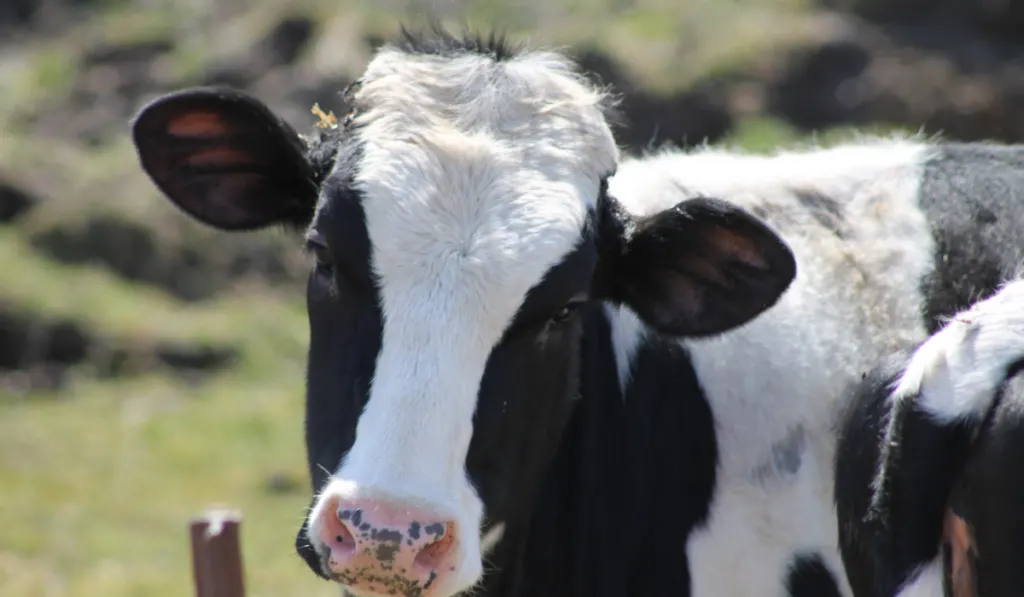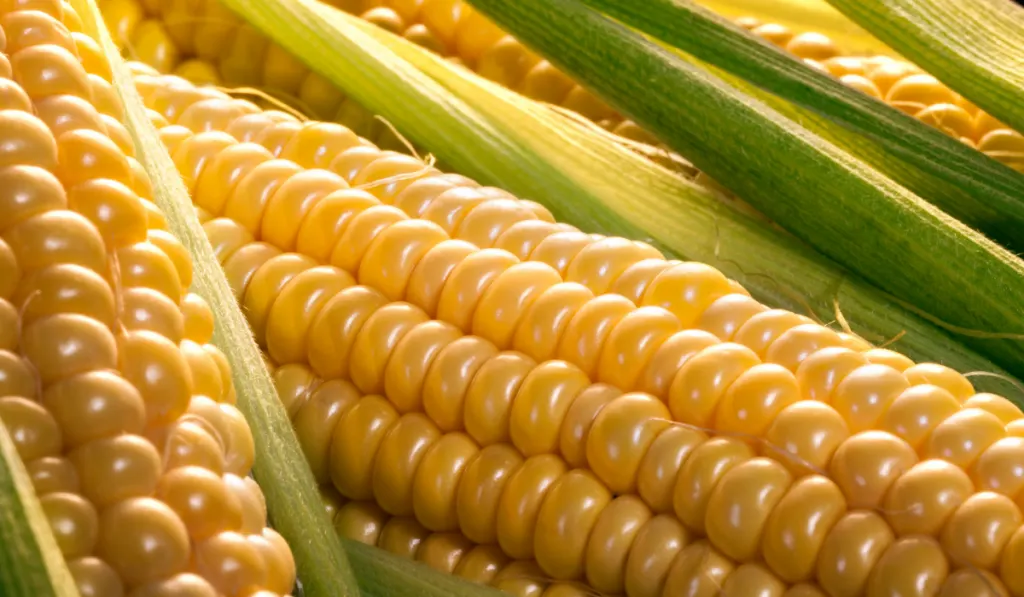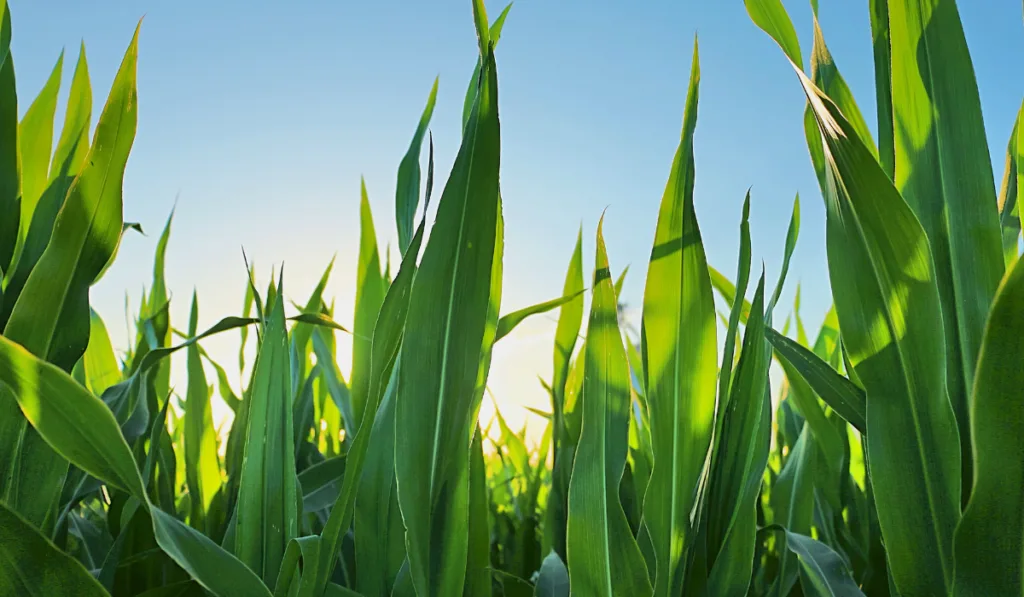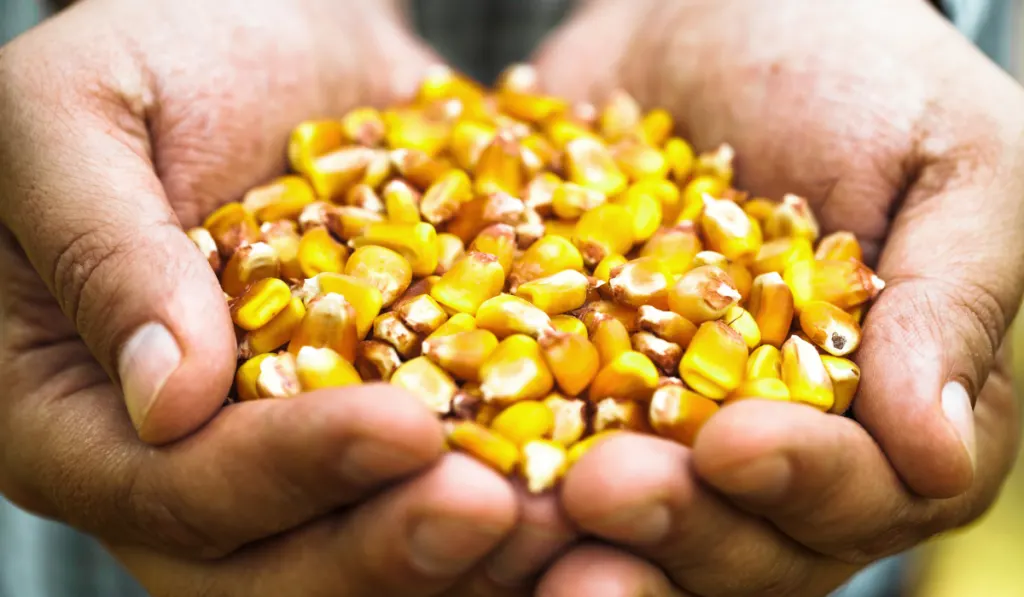If you have ever raised or been around cows, you know that they are very food motivated.
While cows cannot eat everything, corn has long been a staple food for cattle on many farms across the country and world.
A lot of information out there says corn is bad for cows, but is that really true?
Should Cows Eat Corn? Cows should eat corn because it is vital for their growth.
Cows that eat corn need to maintain a balanced diet to keep their bodies functioning properly.
They can eat more than just the corn kernels but it is important to know what parts of the entire corn stalk are safe for cows.
Cows love to eat corn and despite what the naysayers are claiming, if fed properly, corn is not bad for cows!

Corn provides several benefits to both cows and their owners.
There are some precautions, however, that you should always take when feeding corn to cattle to prevent dangerous overfeeding situations.
Table of Contents
What Kind of Corn Should Cows Eat?
Cows can safely eat cracked corn, whole corn, and fresh corn in moderation.
Corn that is safe for cattle is usually sold in feed stores as whole kernels or as cracked corn, which just means that it has been rolled so that it breaks, or cracks, open.
Cracked is somewhere between 5 to 10 percent more digestible for cows than whole corn.
Finely ground corn should not be fed to cattle as it can ferment too fast in the cow’s digestive system causing dangerous bloating and gastric distress. (source)
How Healthy is Corn for Cows?
Corn is extremely healthy for cows.
It contains starches and protein that together help cows grow and maintain their weight throughout the year, especially when grass is scarce.
Corn provides a substantial amount of energy for cows, allowing them to keep their bodies warm as well as produce extra milk for their young. (source)

Should Cows Eat Corn Cobs?
Cows can eat corn cobs in limited amounts of course, because they are good for them.
After they eat any remaining corn off the cob, cows will usually continue to chew up and eat the cob as well.
They are soft enough for adult cows to eat easily.
Corn cobs should not be fed to young calves just to be safe and avoid possible choking incidents.
Are Corn Husks Safe for Cows?
Corn husks are very safe for cows to eat and they provide a source of forage.
They should not replace a cow’s daily forage consumption, but they can be added supplementally.
Husks are easily digestible for cows and they contain around 3.5 % of crude protein. (source)
Be sure to space out feedings to keep cows eating a limited amount each day.

Should Cows Eat Corn Stalks?
Corn stalks are perfectly fine for cows to eat, as long as they are fed in moderation.
Grass and hay forage should always make up the majority of a cow’s daily diet, but they can eat corn stalks as a supplemental forage.
Dry and fresh corn stalks are both safe for cows to eat.
Cows should not be fed moldy or soured corn stalks that smell fermented. (source)
Is Corn Silage Safe for Cows?
Corn silage is corn and other plant by-products that are chopped, ground up, stored, and covered so that it can ferment in a healthy way that is safe for cows.
Only farmers experienced with silage should make corn silage for cattle consumption.
When created properly, corn silage can provide between 8.6 and 8.4 percent crude protein for cattle. (source)
Corn silage is a great low-cost solution for keeping cows fed and healthy during the winter when quality forage can be hard to find.
Why Feed Corn to Cows?
Corn is a great option to feed cows because it helps cows to gain weight more quickly than with other options.
It is a relatively cheap food option for farmers and often easy to come by, even in the winter months.
Corn contains more nutrients on average than the average pasture grass does. (source)

How Much Corn Can a Cow Eat Daily?
Corn should be fed to cows along with their normal diet of fresh pasture grass or hay.
Corn is too low in protein to be fed completely as 100% of a cow’s daily diet.
It is recommended to only feed most cows less than .4 percent of their overall body weight in corn per day. (source)
Corn should be introduced to a cow’s diet slowly.
If feeding other corn plant products like the cob or the stalks, limit the daily consumption so they are not overloaded with corn.
Cows will eat corn and corn products often before they will eat their regular hay or pasture, so be sure to only feed it in limited amounts at a time.
Should Cows Eat Canned Corn?
Canned corn should not be fed to cows.
Canned corn is moist and may ferment too quickly in a cow’s digestive system.
It also tends to have a lot of added sodium.
Stick with fresh or cow-quality dried corn products when it comes to feeding your cows.

What is Corn Overload?
High levels of corn consumption in a short period of time can cause severe problems in cows.
The corn will start to ferment inside the animal because their digestive systems are overloaded.
Cows that uncover a whole bin of corn or graze on a corn field unchecked, can suffer from grain overload.
The amount that causes overload depends on how used to eating corn a cow has become.
If a cow in your care ever eats a large amount of corn, watch for signs of overload.
Symptoms of corn/grain overload include depression, a lowered head, hanging ears, discomfort, staggering, and a noticeable decrease in responsiveness.
You should contact a vet immediately if you ever think this has happened to your cow as it can become fatal quickly if not resolved. (source)
Final Thoughts
Cows love to eat corn and most farmers love how cheap it usually is, so it is a win-win for everyone on the farm!
Hay and pasture grass should always make up the majority of your cow’s diet unless they are headed for the meat market.
Corn and corn plant products should be fed in moderation so that cow’s are still able to eat their normal diet.
Avoid overfeeding, keep the corn safely contained to prevent binging accidents, and your cows will continue to safely enjoy eating corn.
